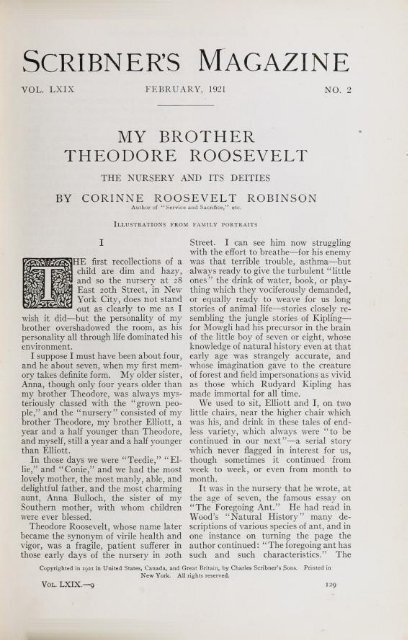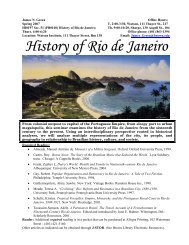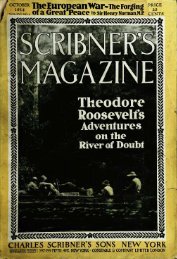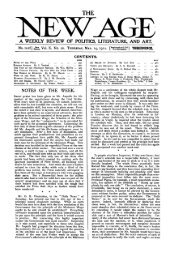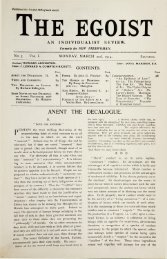View PDF - the CDI home page.
View PDF - the CDI home page.
View PDF - the CDI home page.
You also want an ePaper? Increase the reach of your titles
YUMPU automatically turns print PDFs into web optimized ePapers that Google loves.
SCRIBNERS MAGAZINE<br />
VOL. LXIX FEBRUARY, 1921 NO. 2<br />
MY BROTHER<br />
THEODORE ROOSEVELT<br />
I<br />
THE NURSERY AND ITS DEITIES<br />
B Y C O R I N N E R O O S E V E L T R O B I N S O N<br />
tHE first recollections of a<br />
child are dim and hazy,<br />
and so <strong>the</strong> nursery at 28<br />
East 20th Street, in New<br />
York City, does not stand<br />
•out as clearly to me as I<br />
wish it did—but <strong>the</strong> personality of my<br />
bro<strong>the</strong>r overshadowed <strong>the</strong> room, as his<br />
personality all through life dominated his<br />
environment.<br />
I suppose I must have been about four,<br />
and he about seven, when my first memory<br />
takes definite form. My older sister,<br />
Anna, though only four years older than<br />
my bro<strong>the</strong>r Theodore, was always mysteriously<br />
classed with <strong>the</strong> "grown people,"<br />
and <strong>the</strong> "nursery" consisted of my<br />
bro<strong>the</strong>r Theodore, my bro<strong>the</strong>r Elliott, a<br />
year and a half younger than Theodore,<br />
and myself, still a year and a half younger<br />
than Elliott.<br />
In those days we were "Teedie," "Ellie,"<br />
and "Conie," and we had <strong>the</strong> most<br />
lovely mo<strong>the</strong>r, <strong>the</strong> most manly, able, and<br />
delightful fa<strong>the</strong>r, and <strong>the</strong> most charming<br />
aunt, Anna Bulloch, <strong>the</strong> sister of my<br />
Sou<strong>the</strong>rn mo<strong>the</strong>r, with whom children<br />
were ever blessed.<br />
Theodore Roosevelt, whose name later<br />
became <strong>the</strong> synonym of virile health and<br />
vigor, was a fragile, patient sufferer in<br />
those early days of <strong>the</strong> nursery in 20th<br />
Author of " Service and Sacrifice," etc.<br />
ILLUSTRATIONS FROM FAMILY PORTRAITS<br />
Street. I can see him now struggling<br />
with <strong>the</strong> effort to brea<strong>the</strong>—for his enemy<br />
was that terrible trouble, asthma—but<br />
always ready to give <strong>the</strong> turbulent "little<br />
ones" <strong>the</strong> drink of water, book, or plaything<br />
which <strong>the</strong>y vociferously demanded,<br />
or equally ready to weave for us long<br />
stories of animal life—stories closely resembling<br />
<strong>the</strong> jungle stories of Kipling—<br />
for Mowgli had his precursor in <strong>the</strong> brain<br />
of <strong>the</strong> little boy of seven or eight, whose<br />
knowledge of natural history even at that<br />
early age was strangely accurate, and<br />
whose imagination gave to <strong>the</strong> creature<br />
of forest and field impersonations as vivid<br />
as those which Rudyard Kipling has<br />
made immortal for all time.<br />
We used to sit, Elliott and I, on two<br />
little chairs, near <strong>the</strong> higher chair which<br />
was his, and drink in <strong>the</strong>se tales of endless<br />
variety, which always were "to be<br />
continued in our next"—a serial story<br />
which never flagged in interest for us,<br />
though sometimes it continued from<br />
week to week, or even from month to<br />
month.<br />
It was in <strong>the</strong> nursery that he wrote, at<br />
<strong>the</strong> age of seven, <strong>the</strong> famous essay on<br />
"The Foregoing Ant." He had read in<br />
Wood's "Natural History" many descriptions<br />
of various species of ant, and in<br />
one instance on turning <strong>the</strong> <strong>page</strong> <strong>the</strong><br />
author continued: " The foregoing ant has<br />
such and such characteristics." The<br />
Copyrighted in 1921 in United States, Canada, and Great Britain, by Charles Scribner's Sons. Printed in<br />
New York. All rights reserved.<br />
VOL. LXIX.—9 129


